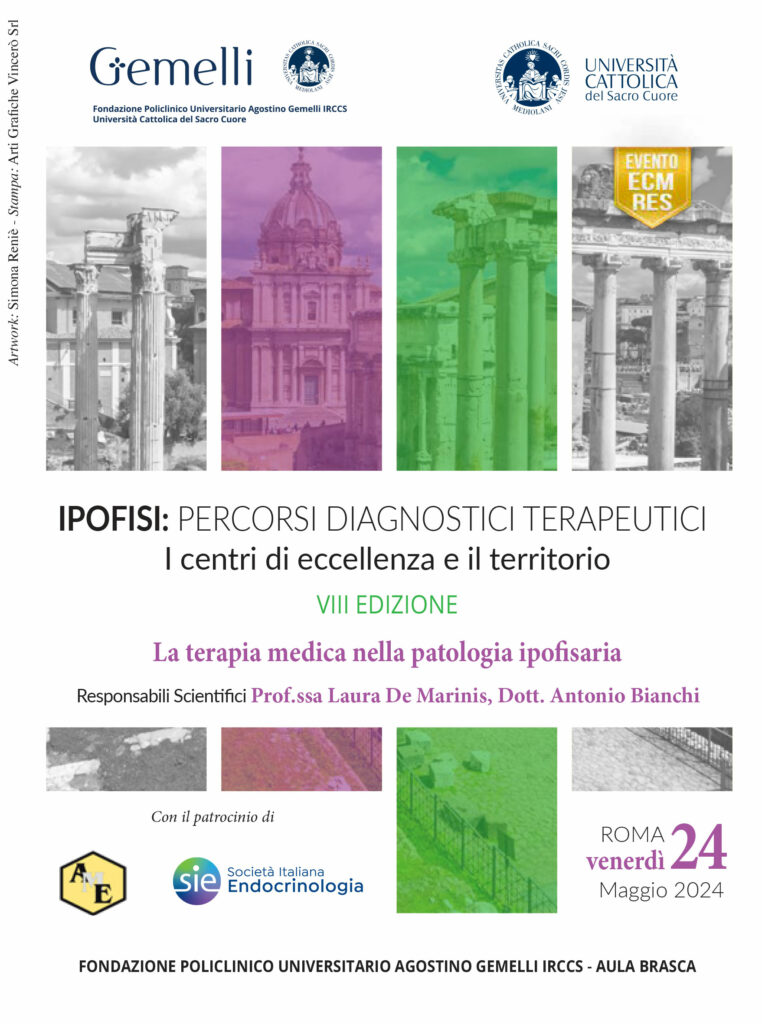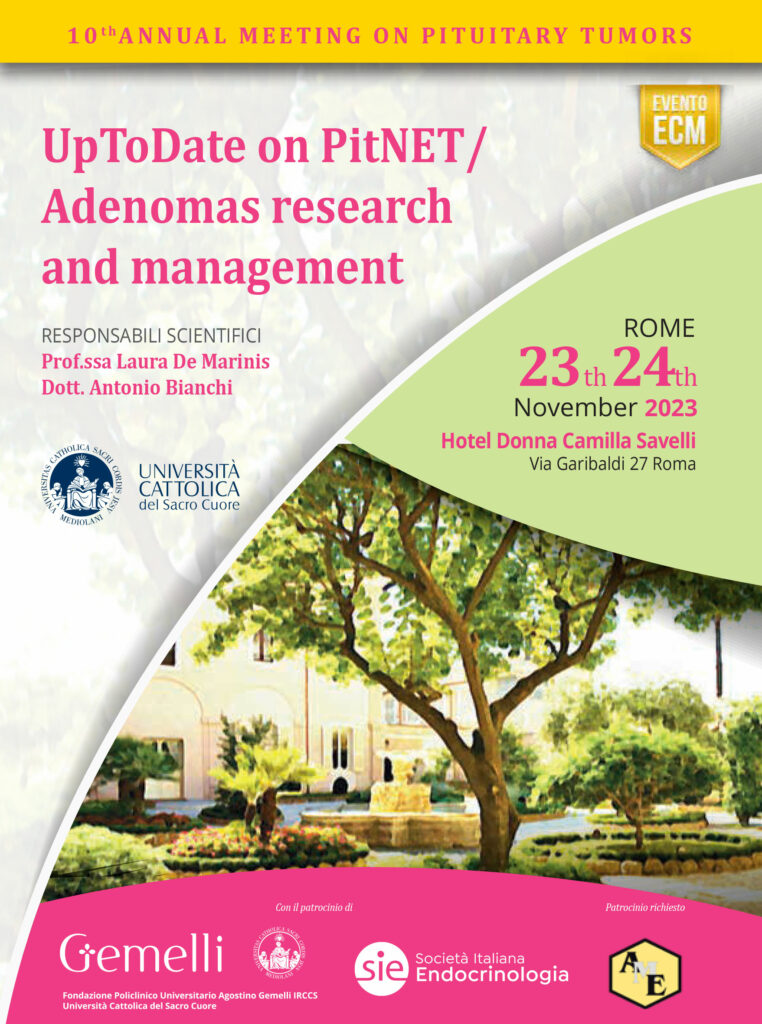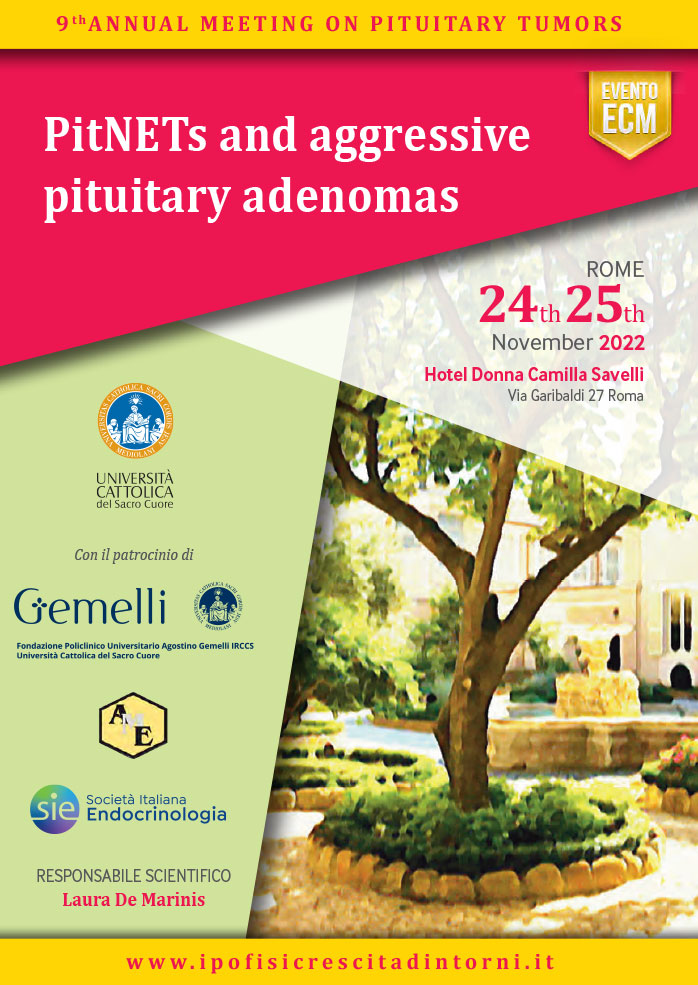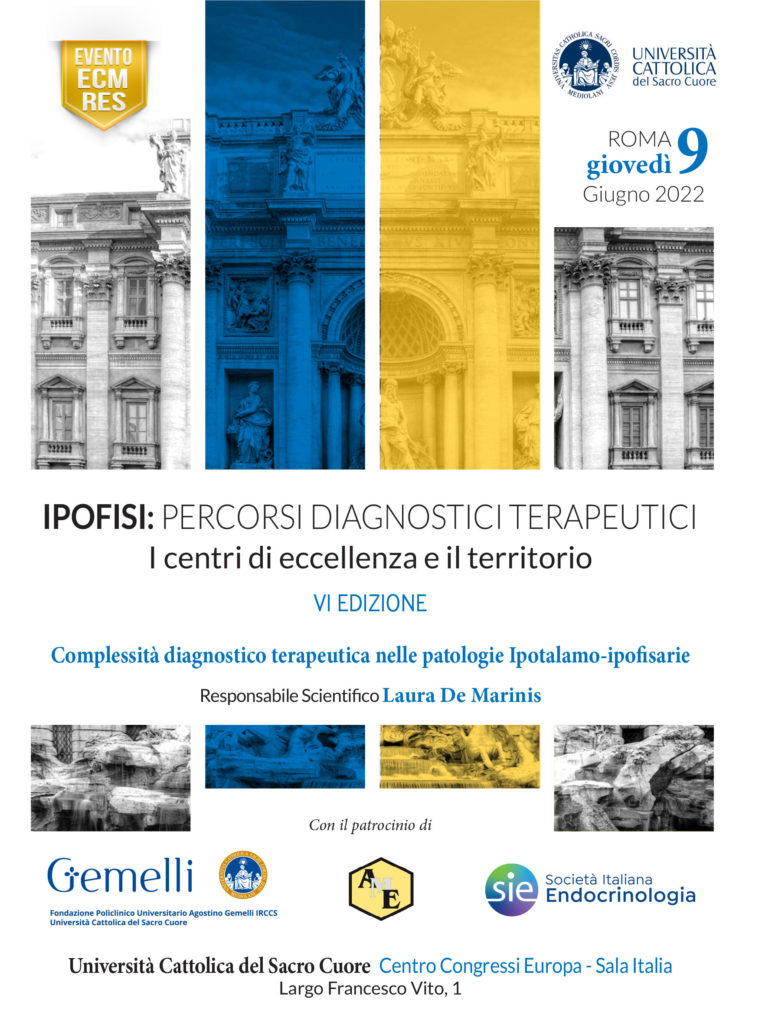XI Edizione – ANNUAL MEETING ON PITUITARY TUMORS
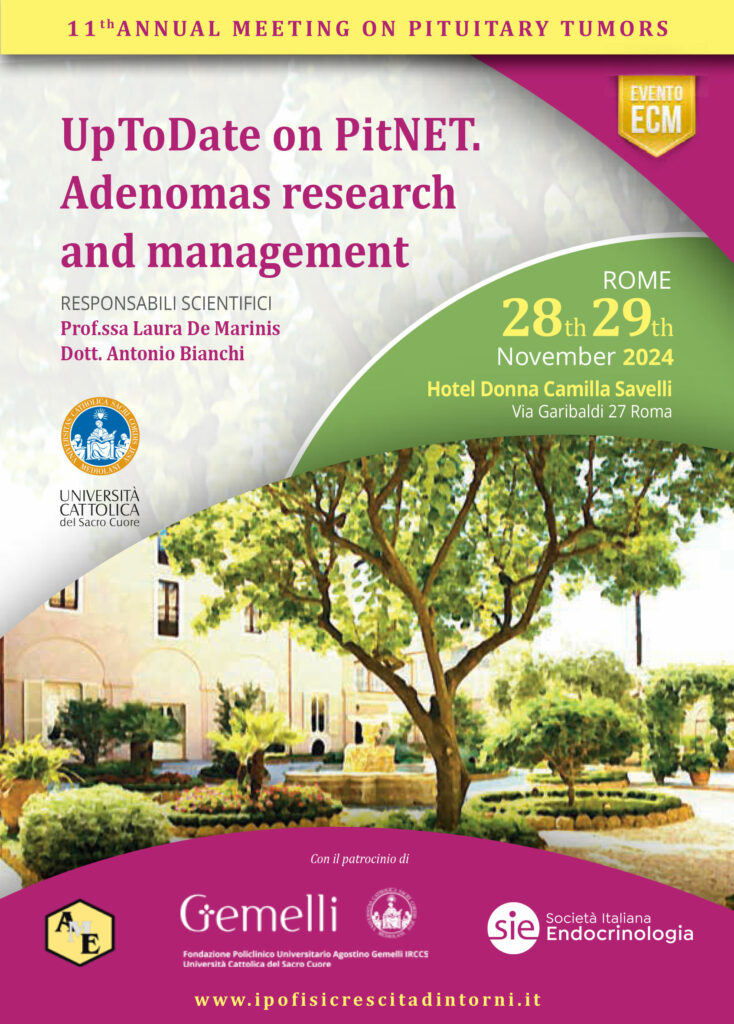
» Scarica il Programma
ROMA 28 – 29 Novembre 2024
Hotel Donna Camilla Savelli
Via Garibaldi 27, 00153 Roma RM
UpToDate on PitNET.
Adenomas research
and management
PRESIDENTE DEL CONGRESSO
Prof. Alfredo Pontecorvi
Direttore del Master Universitario di II Livello in diagnosi e terapia delle patologie ipotalamo-ipofisarie Università Cattolica del Sacro Cuore
RESPONSABILI SCIENTIFICI
Prof.ssa Laura De Marinis
Coordinatore Scientifico del Master Universitario di II Livello in diagnosi e terapia delle patologie ipotalamo-ipofisarie – Università Cattolica del Sacro Cuore – Roma
Dott. Antonio Bianchi
Dirigente medico I livello U.O.S. di Patologie Ipotalamo-ipofisarie – Fondazione Policlinico Universitario A. Gemelli – IRCCS Roma
SEDE
Hotel Donna Camilla Savelli
Via Garibaldi 27, 00153 Roma RM
PROVIDER E SEGRETERIA ORGANIZZATIVA

DOTCOM S.r.l. Unipersonale
Provider Standard accreditato presso la Commissione Nazionale ECM – ID 680
Via Flaminia, 54 | 00196 Roma
Tel. 06 406 1370 | Fax 06 324 2600
E-Mail: info@dotcomeventi.com
Sito web: www.dotcomeventi.com
ECM 680 – 429184
DESTINATARI
L’evento è accreditato per n° 100 partecipanti per le seguenti figure professionali:
• Medico – Chirurgo: Anatomia Patologica, Chirurgia Generale, Endocrinologia, Gastroenterologia,
Genetica Medica, Malattie Metaboliche e Diabetologia, Medicina Interna, Medicina Nucleare, Neurochirurgia, Neuroradiologia, Oftalmologia, Otorinolaringoiatria, Patologia Clinica (Laboratorio di Analisi Chimico- Cliniche e Microbiologia), Radiodiagnostica, Radioterapia
• Infermiere
Assegnati n. 10 crediti formativi ECM
L’attestazione dei crediti ottenuti è subordinata alla partecipazione del 90% della durata dei
lavori, alla compilazione della scheda di valutazione dell’evento e al superamento della prova
di apprendimento (questionario, almeno 75% risposte esatte).
OBIETTIVO FORMATIVO
Documentazione clinica. Percorsi clinico-assistenziali diagnostici e riabilitativi, profili di assistenza
– profili di cura
PRE-ISCRIZIONE
La pre-iscrizione potrà essere effettuata online collegandosi al sito www.dotcomeventi.com nella
sezione “EVENTI & CONGRESSI IN CORSO”. L’accesso in aula è riservato ai primi 100 partecipanti.
Si ricorda che l’attestazione dei crediti formativi ECM è subordinata alla partecipazione del 90%
della durata dei lavori, alla compilazione della scheda di valutazione dell’evento e al superamento
della prova di apprendimento (questionario, almeno 75% risposte esatte).
RATIONALE
Adeno-pituitary tumour represents a complex disease, with a wide spectrum of clinical manifestations, according to the ability of secreting different hormones or prohormones and of invading the neighbouring anatomical structures, such as the same
pituitary gland, the optical chiasm, the cavernous sinus, the bone, the third ventricle
and the ventricular system.
In the most recent years, a better definition of these neoplasia was researched in
order to identify biomarkers able to predict the natural history of adeno-pituitary
tumour and their responsiveness to the different treatments.
Until now, the classifications of the neoplasms arising from adeno-hypophysial cells
have been misleading because of their poor reproducibility and their weak ability
in predicting the aggressiveness, the prognosis, and the outcome of these neoplasia.
The 2004 WHO classification distinguished pituitary adenoma in typical and atypical ones according to the detection of mitoses and according to the expression of
Ki-67 or p53. The 2004 WHO classification however failed in identifying pituitary
tumours refractory to medical, surgical or radiation therapies or able to regrowth
or to metastasize. Similarly, the new 2017 WHO classification lacks in defining the
prognosis of pituitary neoplasia. Invasive, recurrent and proliferative pituitary neoplasia cause significant morbidity, in particular in cases of persistence hormonal
hyper-secretion. Both long term hormonal hyper-secretion and hypopituitarism, in
absence of an adequate hormonal replacement therapy, are associated to increased
morbidity and mortality for their systemic complications, in particular bone fragility,
that represent an emerging and irreversible complication requiring a prompt and
personalities treatment.
Therefore, recently, adeno-pituitary tumours were included in neuroendocrine tumours (NETs). This new terminology of pituitary neuroendocrine tumor (PitNET)
may reflect better the potential for aggressiveness and malignant behaviour and of
these neoplasia. Anyway a consensus on PitNETs was not jet reached.
On this basis, in the recent years, a wide number of research investigated the genetic,
molecular and biological features of PitNETs, in order to predict the clinical behaviour of these neoplasia and to personalize the treatments in not-secreting and secreting tumors as prolactinoma, acromegaly, Cushing disease. The current event has
the aim of updating participants on the latest biological, genetic and clinical acquisitions on PitNET and on their impact in the management of PitNET affected patients
according to the new knowledge, that requires a close clinical collaboration between
pathologists, neurosurgeries and endocrinologists.
The meeting is part of the teaching activities of the Master Degree in Diagnosis and
Treatment of pituitary disease (2024) – Faculty of Medicine, Università’ Cattolica del
Sacro Cuore, Rome.


